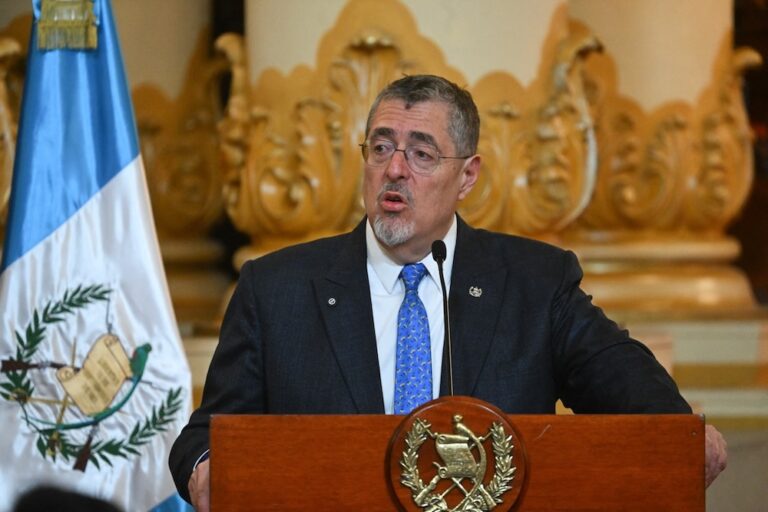The editor of the daily "La Hora" accused the government of using intimidation tactics against the paper after it published a story about a programme that has been criticised for a lack of transparency.
(CERIGUA/IFEX) – Óscar Clemente Marroquín, the editor of the daily “La Hora”, has accused the government of using the Public Prosecutor’s Office (Ministerio Público) to intimidate the paper after it published a story about a programme that hands out payments to families living in poverty. The government programme, called “Mi Familia Progresa” (My Family Moves Forward), has been criticised for lacking in transparency.
According to information in the local media, on 24 February 2010 “La Hora” was the first newspaper to publish information about a documentation centre where information about the programme’s beneficiaries is processed. On the same day, opposition congresswoman Roxana Baldetti and the comptroller general, Carlos Mencos, went to the documentation centre to request information.
On several occasions Congresswoman Nineth Montenegro has also requested information about the programme so that it could be monitored, including by filing a request before the Supreme Court of Justice and the Constitutional Court.
After the publication of the information about the government programme, two employees from the Public Prosecutor’s Office went to the newspaper’s premises and asked if the paper’s reporters had been sent to the documentation centre. “Apparently the government is developing new strategies to target the independent press, including by using the Public Prosecutor’s Office to harass the media,” Marroquín said.
Marroquín also noted that Attorney General Amílcar Velásquez Zárate and the secretary general of the Public Prosecutor’s Office Council, Gloria Porras, told him that the visit by investigators to the media outlet’s offices was inappropriate. “We will await the results of the investigation they promised,” Marroquín said.
Human Rights Ombudsman Sergio Morales has opened an investigation into the incident to determine whether it constituted a freedom of expression violation.
RECOMMENDED ACTION:
Send appeals to the authorities:
– calling on the them to ensure respect for freedom of expression and access to public information, in line with national regulations and international agreements to which Guatemala is a party
APPEALS TO:
Ruth del Valle
Comisionada Presidencial de los Derechos Humanos
(Presidential Human Rights Commissioner)
2a Avenida 10-50, zona 9
Ciudad de Guatemala, Guatemala
Fax: +502 2334 0119
Sergio Morales Alvarado
Procurador de los Derechos Humanos
(Human Rights Ombudsman)
12 Avenida 12-72, zona 1
Ciudad de Guatemala, Guatemala
Fax: +502 2424 1717
Correo electrónico: ososa@pdh.org.gt
Fiscalía Especial de Delitos contra Periodistas y Sindicalistas
Ministerio Público
(Office of the Special Prosecutor for Crimes against Journalists and Labour Union Members)
7a Avenida 11-20 zona 1, segundo nivel
Ciudad de Guatemala, Guatemala
Fax: +502 2220 6873
Oficina del Alto Comisionado de las Naciones Unidas Sobre Derechos Humanos para Guatemala
(Office of the UN High Commissioner for Human Rights in Guatemala)
13 calle 3-40 zona 10, Edifico Atlantils, oficina 803
Ciudad de Guatemala, Guatemala
Fax: +502 2382 3410
Correo electrónico: emorales@ohchr.org.gt
Raúl Velásquez
Ministro de Gobernación
(Interior Minister)
6a Avenida 4-64, zona 1
Ciudad de Guatemala, Guatemala
Fax: +502 2362 0237 / 2339 4474
Correo electrónico: ministro@mingob.gob.gt
Director de la Policía Nacional Civil
(Director, National Police)
Dirección General de la Policía Nacional Civil
6a Avenida 13-71, zona 1
Ciudad de Guatemala, Guatemala
Fax: +502 2238 1474
Please copy appeals to the source if possible.


